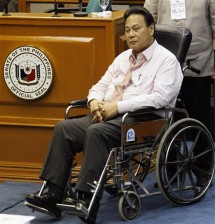In The Know: Hypoglycemia

Chief Justice Renato Corona, a longtime diabetic with two bypass surgeries in the past, was still confined at the intensive care unit of The Medical City in Pasig City due to the “hypoglycemic episode” he suffered soon after delivering a three-hour “opening statement” on Tuesday.
Hypoglycemia occurs when the blood glucose drops below normal levels.
Glucose, a form of sugar, is absorbed into the bloodstream from food as the body’s source of energy.
When it is used up too quickly, or when it is released into the bloodstream too slowly, the body’s blood glucose may fall. This situation prompts the liver to produce and release glucose to compensate and bring the blood glucose level back to normal.
A hypoglycemic episode happens when the blood glucose does not rebound to normal levels.
Blood glucose below 60 mg/dL is considered low.
Article continues after this advertisementAmong the signs of hypoglycemia are hunger, weakness and nausea. A person experiencing hypoglycemia may also feel dizzy, anxious and have difficulty in speaking.
Article continues after this advertisementAmong people with diabetes, hypoglycemia may be triggered by skipping meals or taking medicines at the wrong time. Engaging in strenuous activities and drinking alcohol may also result in hypoglycemia.
Hypoglycemia may be treated quickly by eating or drinking glucose-rich food. The best options are sugars absorbed into the bloodstream quickly, such as four ounces of orange juice, six ounces of regular soda, five to seven hard candies, or two to five glucose tablets.
If left untreated, hypoglycemia may get worse and lead to seizures, coma or death.
A 2008 study by the US Department of Veterans Affairs Medical Center said hypoglycemia among Type 2 diabetics may also be a prelude to a heart attack or stroke.
Preliminary results of the study among 1,791 US veterans found that patients who had become severely hypoglycemic in the past three months were two or three times more likely to suffer a heart attack, stroke or death. Lawrence de Guzman, Inquirer Research
Sources: American Diabetes Association; Johns Hopkins Health Alerts; National Diabetes Information Clearinghouse